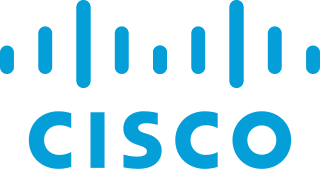
A router is a computer and networking device that forwards data packets between computer networks, including internetworks such as the global Internet.

An intranet is a computer network for sharing information, easier communication, collaboration tools, operational systems, and other computing services within an organization, usually to the exclusion of access by outsiders. The term is used in contrast to public networks, such as the Internet, but uses the same technology based on the Internet protocol suite.

Cisco Systems, Inc. is an American multinational digital communications technology conglomerate corporation headquartered in San Jose, California. Cisco develops, manufactures, and sells networking hardware, software, telecommunications equipment and other high-technology services and products. Cisco specializes in specific tech markets, such as the Internet of things (IoT), domain security, videoconferencing, and energy management with products including Webex, OpenDNS, Jabber, Duo Security, Silicon One, and Jasper.
Virtual private network (VPN) is a network architecture for virtually extending a private network across one or multiple other networks which are either untrusted or need to be isolated.

The point of sale (POS) or point of purchase (POP) is the time and place at which a retail transaction is completed. At the point of sale, the merchant calculates the amount owed by the customer, indicates that amount, may prepare an invoice for the customer, and indicates the options for the customer to make payment. It is also the point at which a customer makes a payment to the merchant in exchange for goods or after provision of a service. After receiving payment, the merchant may issue a receipt, as proof of transaction, which is usually printed but can also be dispensed with or sent electronically.

Akamai Technologies, Inc. is an American delivery company that provides content delivery network (CDN), cybersecurity, DDoS mitigation, and cloud services. Headquartered in Cambridge, Massachusetts, it operates a worldwide network of servers whose capacity it rents to customers running websites and other web services.
Hybrid fiber-coaxial (HFC) is a broadband telecommunications network that combines optical fiber and coaxial cable. It has been commonly employed globally by cable television operators since the early 1990s.

Internet Protocol television (IPTV), also called TV over broadband, is the service delivery of television over Internet Protocol (IP) networks. Usually sold and run by a telecom provider, it consists of broadcast live television that is streamed over the Internet (multicast) — in contrast to delivery through traditional terrestrial, satellite, and cable transmission formats — as well as video on demand services for watching or replaying content (unicast).
A dedicated hosting service, dedicated server, or managed hosting service is a type of Internet hosting in which the client leases an entire server not shared with anyone else. This is more flexible than shared hosting, as organizations have full control over the server(s), including choice of operating system, hardware, etc.
Cisco LocalDirector was a server load balancing appliance, discontinued in 2003, based on the Network Address Translation (NAT) technology Cisco Systems acquired when they bought Network Translation, Inc. The LocalDirector was conceived by John Mayes & Robert Andrews in late 1995 during a pre-acquisition meeting with Robert, Webmaster at Netscape Communications Corporation. During the meeting, Robert Andrews told John Mayes that there were, "probably 10 customers in the world with a load balancing problem". Because of this, the decision was made to begin development on the LocalDirector.
The Technology and Engineering Emmy Awards, or Technology and Engineering Emmys, are one of two sets of Emmy Awards that are presented for outstanding achievement in engineering development in the television industry. The Technology and Engineering Emmy Awards are presented by the National Academy of Television Arts and Sciences (NATAS), while the separate Primetime Engineering Emmy Awards are given by its sister organization the Academy of Television Arts & Sciences (ATAS).
Madge Networks NV was a networking technology company founded by Robert Madge, and is best known for its work with Token Ring. It was a global leader and pioneer of high-speed networking solutions in the mid-1990s, and also made significant contributions to technologies such as Asynchronous Transfer Mode (ATM) and Ethernet.

A computer network is a set of computers sharing resources located on or provided by network nodes. Computers use common communication protocols over digital interconnections to communicate with each other. These interconnections are made up of telecommunication network technologies based on physically wired, optical, and wireless radio-frequency methods that may be arranged in a variety of network topologies.

Telecommunications engineering is a subfield of electronics engineering which seeks to design and devise systems of communication at a distance. The work ranges from basic circuit design to strategic mass developments. A telecommunication engineer is responsible for designing and overseeing the installation of telecommunications equipment and facilities, such as complex electronic switching system, and other plain old telephone service facilities, optical fiber cabling, IP networks, and microwave transmission systems. Telecommunications engineering also overlaps with broadcast engineering.

A computer appliance is a computer system with a combination of hardware, software, or firmware that is specifically designed to provide a particular computing resource. Such devices became known as appliances because of the similarity in role or management to a home appliance, which are generally closed and sealed, and are not serviceable by the user or owner. The hardware and software are delivered as an integrated product and may even be pre-configured before delivery to a customer, to provide a turn-key solution for a particular application. Unlike general purpose computers, appliances are generally not designed to allow the customers to change the software and the underlying operating system, or to flexibly reconfigure the hardware.

Multiven Group BV is a Netherlands-based provider of independent and decentralised software integrity maintenance and cyber-defence services for multivendor Internet Protocol network hardware and blockchain nodes. Its customers include large enterprises, Internet service providers, small, medium businesses, Telecommunications companies, Fortune 500, Academia and government agencies.

Cisco Eos was a software platform for Media & Entertainment (M&E) companies developed by the Cisco Media Solutions Group.
Linode, LLC was an American cloud hosting provider that focused on providing Linux-based virtual machines, cloud infrastructure, and managed services.

Mobile technology is the technology used for cellular communication. Mobile technology has evolved rapidly over the past few years. Since the start of this millennium, a standard mobile device has gone from being no more than a simple two-way pager to being a mobile phone, GPS navigation device, an embedded web browser and instant messaging client, and a handheld gaming console. Many experts believe that the future of computer technology rests in mobile computing with wireless networking. Mobile computing by way of tablet computers is becoming more popular. Tablets are available on the 3G and 4G networks.
The Zettabyte Era or Zettabyte Zone is a period of human and computer science history that started in the mid-2010s. The precise starting date depends on whether it is defined as when the global IP traffic first exceeded one zettabyte, which happened in 2016, or when the amount of digital data in the world first exceeded a zettabyte, which happened in 2012. A zettabyte is a multiple of the unit byte that measures digital storage, and it is equivalent to 1,000,000,000,000,000,000,000 (1021) bytes.










